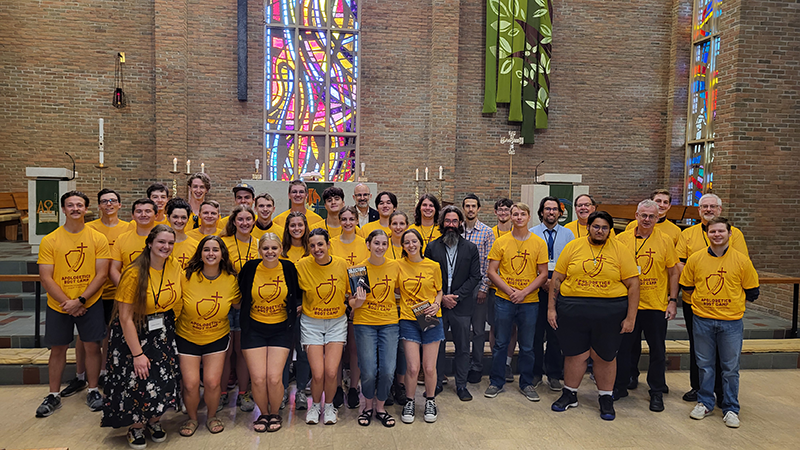
Before the majority of the campus community returned to River Forest for the fall term, a group of 40 current and incoming students gathered together for a four-day Apologetics Boot Camp. The boot camp, a first for Concordia University Chicago, featured presentations by professors and theologians from within the University and its broader community, along with panel and small group discussions, fellowship, and other activities.
Apologetics, which is the defense of the Christian faith, can take many forms and apply to many challenges believers face throughout their lives, making it especially relevant to CUC students.
“We recognize that our students are going out from Concordia into a culture that doesn’t share the same commitments to truth, freedom, and vocation,” said Rev. Dr. Kirk Clayton, assistant professor of theology at CUC and one of the boot camp’s planners and presenters. “And so, we want to equip them to be ready to … be a force for truth in a world that’s largely rejected it.”
As the days unfolded, students didn’t just listen — they engaged. They asked questions, participated in peer-led discussions, and reflected on what it means to live out their faith with clarity and conviction. Along the way, several lessons about what apologetics is, and what it isn’t, stood out.
Lesson 1: Apologetics is not only about what you say, but also about how you say it.
Though the first full day of boot camp covered traditional apologetic themes, including the reliability of Scripture, evidence for the resurrection, and the problem of evil and suffering, students learned that intellectual discourse isn’t simply about stating facts and statistics.
“Apologetics isn’t just about having the right answers,” said Rebekah Saucerman, a sophomore in CUC’s Deaconess program, adding that the presenters focused on the relational aspect of apologetics as well.
“They equipped us with good arguments and evidence and things to know in being able to defend your faith, but, at the same time, they kept an emphasis on the relationships you have with people in your life and how you live out your faith,” she said.
Kian Hoppe, a freshman in the Pre-Seminary program, recalled a takeaway from Rev. Dr. Al Espinosa’s presentation: “[Apologetics is] not arguing for the sake of just arguing or winning the argument, but strictly to give a defense of the faith and give that defense in a loving and gentle manner,” Hoppe said.
Lesson 2: Apologetics should keep Christ at the center.
While conversations can involve rational arguments and clever responses in defense of one’s faith, students were reminded that the goal of apologetics is to always point back to Christ — not themselves.
“Across the board, when you’re talking to someone about an apologetic topic, focus on Christ,” summarized Anika Slayton, who recently completed her coursework at CUC and returned to campus to help with the boot camp before beginning her deaconess internship. “Yeah, it’s great to have these one-liners sometimes that you can throw out, but that’s not the point,” she continued. “The point is Christ and … keeping Christ at the center.”
Lesson 3: Apologetics applies to modern challenges.
After covering some of the more classical apologetic topics, speakers and students explored how faith intersects with culture, science, and technology — and how apologetics can help Christians view modern challenges through a biblical lens.
Slayton said she found it interesting that presentations on black holes and AI were on the boot camp’s agenda.
“I tend to divorce AI from apologetics naturally,” Slayton added, “but … the advancement of humans, getting beyond ourselves, that’s not in support of the image of God we’re created in.”
Mary Curtis, a sophomore studying political science and Spanish, also said she was not used to thinking about AI from a Christian perspective, but that AI is not as intelligent as people think.
“It isn’t true intelligence, it’s spitting out answers based on probability,” Curtis added. “We don’t need to be afraid of it, but we shouldn’t rely it for spiritual matters.”
Lesson 4: Apologetics is for every vocation.
Although church work students were encouraged to attend, the boot camp welcomed those from a variety of programs — not just ones preparing to serve LCMS congregations, schools, or ministries.
Curtis noted that conversations about ethics, legal defense of Scripture, and historical evidence for Christianity were particularly of interest to her given her major.
“There’s sometimes this view that ethics is subjective and you just do what’s right for you and don’t bother other people,” Curtis said. “That’s not the case. We do have a set of rules from God and those should influence our everyday life.”
Lesson 5: Apologetics can build community.
The Apologetics Boot Camp offered far more than academic enrichment; it gave students a firm foundation for faithful engagement with the world around them. Beyond the sessions and discussions, students found connection and belonging — even before the term officially began.
“It was very helpful for me as a first-year student to come in before classes even started … to build community,” Hoppe said.
Curtis and Saucerman both added that it was a great opportunity to meet people, from incoming freshman to professors.
“It was really cool to get to be here a week before school started to have time to think about the questions we were talking about and talk with the presenters … getting to know freshman and getting to reconnect with people,” Saucerman said.
Want to learn more about defending your faith? Planning is already underway for next year’s boot camp. Keep an eye out and don’t forget to register!